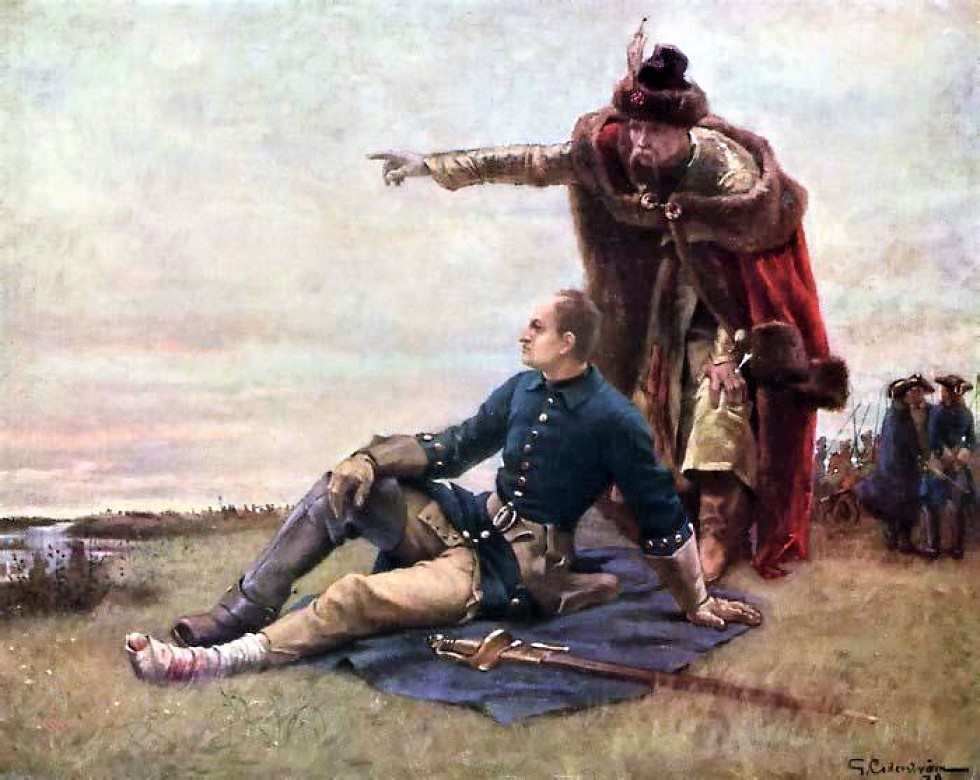Location: Poltava, Ukraine, 1709 AD
Belligerents: Carolus Rex (King Charles XII of Sweden), 25,000 Swedish Regulars; Tsar Peter I the Great of Russia, 40,000 Russian Infantry and Cavalry
The Swedish army had marched for days, low on supplies and in desperate need of a base of operations, through Ukraine. Their army had won numerous battles against the Russians, seemingly invincible, but the harsh Russia terrain gave them nothing to live on. To make matters worse, the Tsar had scorched every inch of earth between the Swedes and the River Vorskla. Charles had lost between 5,000 and 8,000 men through the winter, yet his force of trained and fearless infantry was still strong enough to face the generally ill trained and under equipped Russian forces. Confident that he could take the Russian fortress at Poltava, he led his troops deeper into the Empire.
Tsar Peter knew all too well the dangers of facing Charles. The Swedish King was the fourth in a series of brilliant warrior Kings from the Scandinavian world. While not directly related, he followed in the foot steps of Gustavus Adolphus, the legendary warrior King of Sweden from the days of the Thirty Years War. Gustavus had died leading a cavalry charge. Charles’ Grandfather, Charles X, had begun an era known as the Caroline Era, in which Sweden dominated the Baltic Sea and won a series of wars against the Danes, Fins, Russians, and other nations. Charles XII was as brilliant and fearless as all of them, and he had brought the full might of Sweden to bear at Poltava.
The Swedish Army operated through elite regulars, infantry trained to a very high standard and recruited from all across the kingdom. Fiercely loyal, the Swedes had won many battles and face few setbacks in nearly sixty years. Poltava would change everything.
The Tsar would not face the Swedes as an equal. He brought all the soldiers Russia could produce to the battle, and dug in to wait for the King of the North. As well as forming a line that could outflank the Swedes due to numbers, he set up T shaped artillery batteries meant to flank the Swedes as they left the forest. Knowing that the Swedes had to advance or fall back all the way to Sweden, Peter prepared to fight the battle that would determine the fate of Russia. Should Carolus win the day, Russia’s entire army would be broken and destroyed.
Just days before the battle, a stray bullet struck Charles in the foot during a small skirmish on the outskirts of the town. He was forced to retreat and recoup, leaving the forces in the command of two competent generals, Field Marshal Carl Gustav Rehnskiöld and General Adam Ludwig Lewenhaupt. The two men were veterans and brilliant commanders, yet they were not the King. Marching into battle on the 27th of June, they found themselves outnumbered, outflanked, and starving. They dispatched 2,600 infantry to defeat the artillery batteries which were wreaking havoc on the Swedish lines. Due to the custom of the time, the Swedish fought in large blocks of men, firing muskets in volleys to break the enemy ranks. When cannon struck these ranks, up to a dozen men could perish in an instant.
As the line advanced, the unit sent to eliminate the artillery was isolated and forced to surrender. Facing the Russian line, the vastly outnumbered Swedes took massive casualties in the first moments of fighting. Morale already low, and without their King to inspire them, the men fought reluctantly. Tsar Peter saw the wavering troops before him, and ordered all 10,000 of the Russian cavalry to charge the Swedish lines, who had already lost one sixth of their infantry. The remaining men broke ranks as the horse charged into their lines, fleeing back to the forests. Charles sent orders for the entire army to retreat, but in the havoc of the rout, his orders were useless. The Russians cut down the Swedish as they retreated, and by the time the survivors reached the safety of the woods, only 5,000 remained. In one battle, Charles had lost his entire army, and Russia had been saved.
The battle is recounted in the song “Poltava”, from the album Carolus Rex, by the Swedish power metal band Sabaton. The album describes the rise and fall of the Swedish Empire, beginning with the rule of Gustavus Adolphus, and ending with the death of Carolus Rex. The band sings a song of mourning, of the end of their empire, and the remaining songs on the album are equally as sad.

Leave a Reply